The new Palestinian prime minister has called on Arab states to provide more financial assistance to the Palestinian Authority amid Israel’s occupation policies and a lack of support from the United States.
Muhammad Shtayyeh “called on the Arab countries to meet their financial obligations by promptly providing the Palestinian Authority with a financial safety net to enable it to face its tight financial situation,” official Palestinian news agency Wafa reported.
He has requested a meeting with donor countries on April 30 to discuss the “ongoing financial war” being waged against the Palestinians by Israel and the US under Trump administration.
Donald Trump has cut funding to hospitals in occupied East Jerusalem and all funding to the United Nations refugee agency. Israel has cut tax income from the Palestinians over attacks against Israelis in the occupied Palestinian territories, where it has a network of illegal settlements.
One of Mr Shtayyeh's immediate challenges is to shore up the cash-strapped Palestinian Authority, which exercises limited self-rule under interim peace accords with Israel.
The US congratulated the new Palestinian government on Sunday, despite Ramallah cutting all public ties with Washington.
"Congratulations to the new Palestinian Authority Cabinet," tweeted Jason Greenblatt, assistant to Mr Trump and special representative for international negotiations.
"With the experience of those on the list, we hope we will be able to work together toward peace and improving Palestinian lives. It's time for a new chapter."
But his appointment was met with criticism from some Palestinian factions, including Fatah’s bitter rivals Hamas, which runs the Gaza Strip.
The group called the move blow to unity efforts that faltered since the two groups signed a new reconciliation deal in Cairo in October 2017, but disputes over power-sharing had blocked the implementation of the agreement.
"This is a separatist government, it has no national legitimacy and it will reinforce the chances of severing the West Bank from Gaza," said a statement issued by Hamas as the swearing ceremony in Ramallah, in the Israeli-occupied West Bank ended.
Analysts say the change of government was made to further isolate Hamas, which has been at odds with the Fatah party of Mr Abbas and Mr Shtayyeh for more than a decade.
They say Mr Abbas, 84, in power since 2005, retains the real decision-making authority.
Two factions of Mr Abbas's Palestine Liberation Organisation refused to take part in Mr Shtayyeh's government.







